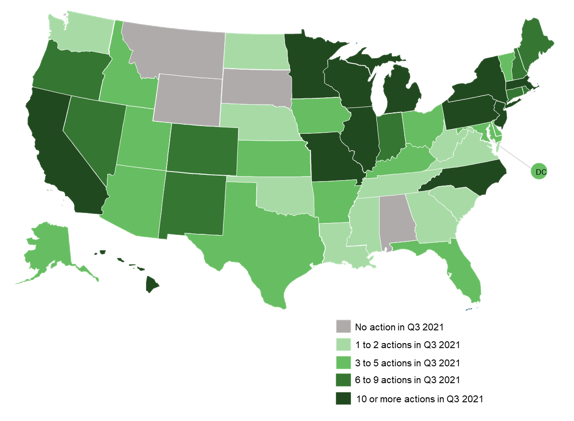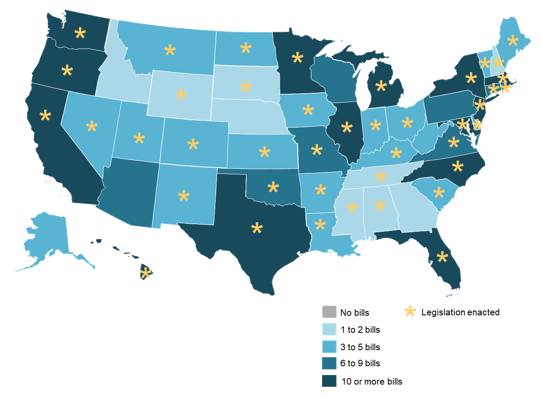Regional Partnerships, Investment in Underserved Communities, and Demand Charge Alternatives Gain Attention in Q3 2021
Raleigh, NC – (November 3, 2021) The N.C. Clean Energy Technology Center (NCCETC) released its Q3 2021 edition of The 50 States of Electric Vehicles. The quarterly series provides insights on state regulatory and legislative discussions and actions on electric vehicles and charging infrastructure.
The report finds that 46 states and the District of Columbia took actions related to electric vehicles and charging infrastructure during Q3 2021 (see figure below), with the greatest number of actions relating to rebate programs, rate design for vehicle charging, and charging station deployment.
A total of 460 electric vehicle actions were taken during Q3 2021, with the most active states being Massachusetts, Illinois, New York, New Jersey, Minnesota, and California. Activity in these states was largely driven by numerous bills related to electric vehicles. So far in 2021, 42 states have enacted legislation affecting transportation electrification.
Q3 2021 State and Utility Action on Electric Vehicles

The report discusses three trends in electric vehicle actions taken in Q3 2021: (1) demand charge alternatives based on utilization under consideration, (2) states and utilities pursuing transportation electrification through regional cooperation, and (3) states dedicating transportation electrification funds for underserved communities.
“We continue seeing strong interest from governors and utilities in collaborating across state lines to build stronger regional networks for EV charging infrastructure,” said Brian Lips, Senior Policy Project Manager at NCCETC.
2021 Proposed Legislation on Electric Vehicles (as of late October 2021)

The report notes five of the top policy developments of the quarter:
- The New York State Legislature adopting 100% zero-emission vehicle sales goals;
- Massachusetts utilities filing major electric vehicle plans;
- Connecticut regulators approving an expansive electric vehicle incentive program
- Illinois legislators requiring utilities to file beneficial electrification plans; and
- New Mexico regulators approving Xcel Energy’s transportation electrification plan.
“States and utilities are taking a variety of approaches to encourage charging infrastructure development, including coordinating their efforts with other states, offering incentives, and designing new rate structures,” noted Autumn Proudlove, Senior Policy Program Director at NCCETC. “Through all of these efforts we are also seeing a growing theme of ensuring significant investment is reaching underserved communities.”
View the 50 States of Electric Vehicles 2021 Q3 Update Executive Summary
View and Purchase the 50 States of Electric Vehicles 2021 Q3 Update FULL Report
View other 50 States Reports – Solar, Grid Modernization and Electric Vehicles
ABOUT THE N.C. CLEAN ENERGY TECHNOLOGY CENTER
The N.C. Clean Energy Technology Center, as part of the College of Engineering at North Carolina State University, advances a sustainable energy economy by educating, demonstrating and providing support for clean energy technologies, practices and policies. It serves as a resource for innovative, sustainable energy technologies through technology demonstration, technical assistance, outreach and training. For more information about the Center, visit: http://www.nccleantech.
MEDIA CONTACT: Shannon Helm, NCCETC, shannon_helm@ncsu.edu
